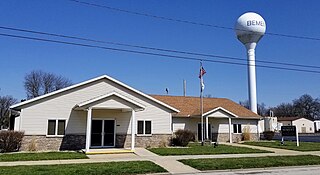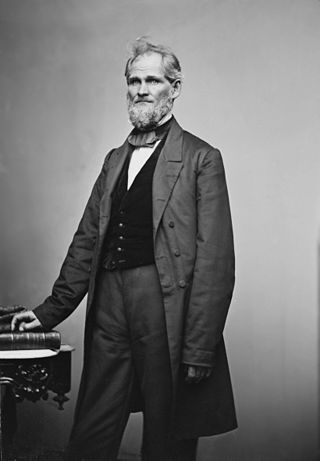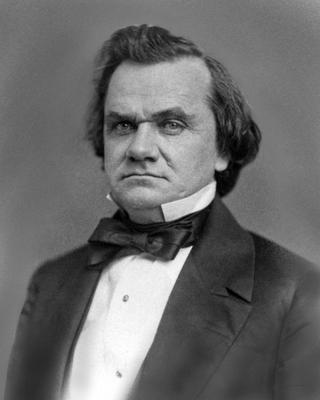
The 1860 United States presidential election was the 19th quadrennial presidential election, held on Tuesday, November 6, 1860. In a four-way contest, the Republican Party ticket of Abraham Lincoln and Hannibal Hamlin won a national popular plurality, a popular majority in the North where states had already abolished slavery, and a national electoral majority comprising only Northern electoral votes. Lincoln's election thus served as the main catalyst of the states that would become the Confederacy seceding from the Union. This marked the first time that a Republican was elected president. It was also the first presidential election in which both major party candidates were registered in the same home state; the others have been in 1904, 1920, 1940, 1944, and 2016.

Piatt County is a county in Illinois. According to the 2020 United States Census, it had a population of 16,673. Its county seat is Monticello.

Bement is a village in Piatt County, Illinois, United States. Its population was 1,484 at the 2020 census.

The Lincoln–Douglas debates were a series of seven debates in 1858 between Abraham Lincoln, the Republican Party candidate for the United States Senate from Illinois, and incumbent Senator Stephen Douglas, the Democratic Party candidate. Until the Seventeenth Amendment to the United States Constitution, which provides that senators shall be elected by the people of their states, was ratified in 1913, senators were elected by their respective state legislatures, so Lincoln and Douglas were trying to win the votes of the Illinois General Assembly for their respective parties.
The Freeport Doctrine was articulated by Stephen A. Douglas at the second of the Lincoln-Douglas debates on August 27, 1858, in Freeport, Illinois. Former one-term U.S. Representative Abraham Lincoln was campaigning to take Douglas's U.S. Senate seat by strongly opposing all attempts to expand the geographic area in which slavery was permitted. Lincoln tried to force Douglas to choose between the principle of popular sovereignty proposed by the Kansas-Nebraska Act, and the majority decision of the United States Supreme Court in the case of Dred Scott v. Sandford, which stated that slavery could not legally be excluded from U.S. territories. Instead of making a direct choice, Douglas's response stated that despite the court's ruling, slavery could be excluded from any territory by the refusal of the people living in that territory to pass laws favorable to slavery. Likewise, if the people of the territory supported slavery, legislation would provide for its continued existence.

Lyman Trumbull was an American lawyer, judge, and politician who represented the state of Illinois in the United States Senate from 1855 to 1873. Trumbull was a leading abolitionist attorney and key political ally to Abraham Lincoln and authored several landmark pieces of reform as chair of the Judiciary Committee during the American Civil War and Reconstruction era, including the Confiscation Acts, which created the legal basis for the Emancipation Proclamation; the Thirteenth Amendment to the United States Constitution, which abolished chattel slavery; and the Civil Rights Act of 1866, which led to the Fourteenth Amendment to the United States Constitution.

The House Divided Speech was an address given by senatorial candidate and future president of the United States Abraham Lincoln, on June 16, 1858, at what was then the Illinois State Capitol in Springfield, after he had accepted the Illinois Republican Party's nomination as that state's US senator. The nomination of Lincoln was the final item of business at the convention, which then broke for dinner, meeting again at 8 pm. "The evening session was mainly devoted to speeches", but the only speaker was Lincoln, whose address closed the convention, save for resolutions of thanks to the city of Springfield and others. His address was immediately published in full by newspapers, as a pamphlet, and in the published proceedings of the convention. It was the launching point of his unsuccessful campaign for the senatorial seat held by Stephen A. Douglas; the campaign would climax with the Lincoln–Douglas debates. When Lincoln collected and published his debates with Douglas as part of his 1860 presidential campaign, he prefixed them with relevant prior speeches. The "House Divided" speech opens the volume.

Henry Smith Lane was a United States representative, Senator, and the 13th Governor of Indiana; he was by design the shortest-serving governor of Indiana, having made plans to resign the office should his party take control of the Indiana General Assembly and elect him to the United States Senate. He held that office for only two days, and was known for his opposition to slavery. A Whig until the party collapsed, he supported compromise with the South. He became an early leader in the Republican Party starting in 1856 serving as the president of the first party convention, delivering its keynote address, and was influential in the nomination of Abraham Lincoln. With the repeal of the Missouri Compromise, he became a full-fledged abolitionist, and in the Senate he was a pro-Union advocate and a strong supporter of the war effort to defeat the Southern Confederacy.

The Metamora Courthouse State Historic Site is a historic American courthouse located in Metamora, Illinois, the former county seat of Woodford County. The courthouse was built in 1845 as the governmental center for Woodford County and as a circuit court for the former Illinois Eighth Circuit. The courthouse is best known for being one of only two surviving Illinois circuit courthouses where future U.S. President Abraham Lincoln practiced law.

The United States Senate election in Illinois was held on November 5, 2002. Incumbent Democratic U.S. Senator Dick Durbin sought re-election to a second term in the United States Senate. Durbin defeated Republican challenger State Representative Jim Durkin in a landslide.

The presidency of James Buchanan began on March 4, 1857, when James Buchanan was inaugurated as 15th president of the United States, and ended on March 4, 1861. Buchanan, a Democrat from Pennsylvania, took office as the 15th United States president after defeating John C. Frémont of the Republican Party and former President Millard Fillmore of the American Party in the 1856 presidential election. He declined to seek re-election and was succeeded by Republican Abraham Lincoln.

The 2010 United States Senate election in Arkansas took place on November 2, 2010, alongside other elections to the United States Senate in other states, as well as elections to the United States House of Representatives and various state and local elections.

Archibald Williams was a United States district judge of the United States District Court for the District of Kansas. Williams was a friend and political ally of President Abraham Lincoln.

Stephen Arnold Douglas was an American politician and lawyer from Illinois. A U.S. Senator, he was one of two nominees of the badly split Democratic Party to run for president in the 1860 presidential election, which was won by Republican candidate Abraham Lincoln. Douglas had previously defeated Lincoln in the 1858 United States Senate election in Illinois, known for the pivotal Lincoln–Douglas debates. He was one of the brokers of the Compromise of 1850 which sought to avert a sectional crisis; to further deal with the volatile issue of extending slavery into the territories, Douglas became the foremost advocate of popular sovereignty, which held that each territory should be allowed to determine whether to permit slavery within its borders. This attempt to address the issue was rejected by both pro-slavery and anti-slavery advocates. Douglas was nicknamed the "Little Giant" because he was short in physical stature but a forceful and dominant figure in politics.

The 1998 United States Senate election in Arkansas was held on November 3, 1998. Incumbent Democratic Senator Dale Bumpers chose to retire instead of running for reelection to a fifth term. Making this was the first open seat with no incumbent held in this seat since the 1884 election. Democratic former U.S. Representative Blanche Lincoln won the open seat against Republican State Senator Fay Boozman. At 38, Lincoln was the youngest woman ever elected to the United States Senate.
The Abraham Lincoln National Heritage Area is a National Heritage Area in central Illinois telling the story of Abraham Lincoln. Spanning 43 counties, it is a federally-designated area intended to encourage historic preservation and an appreciation of the history and heritage of the site, with assistance from the National Park Service.

The 1858–59 United States Senate elections were held on various dates in various states. As these U.S. Senate elections were prior to the ratification of the Seventeenth Amendment in 1913, senators were chosen by state legislatures. Senators were elected over a wide range of time throughout 1858 and 1859, and a seat may have been filled months late or remained vacant due to legislative deadlock. In these elections, terms were up for the senators in Class 2.

The 2014 United States Senate election in Illinois took place on November 4, 2014, to elect a member of the United States Senate to represent the State of Illinois, concurrently with the election of the Governor of Illinois, as well as other elections to the United States Senate in other states and elections to the United States House of Representatives and various state and local elections.
The following outline is provided as an overview of and topical guide to Abraham Lincoln:
This article documents the political career of Abraham Lincoln from the end of his term in the United States House of Representatives in March 1849 to the beginning of his first term as President of the United States in March 1861.

















